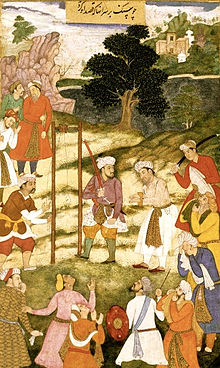
Back التجديف في الإسلام Arabic ইসলাম ও ধর্ম অবমাননা Bengali/Bangla اسلام و کفرگویی Persian Blasphème#Islam French Penistaan dalam Islam ID イスラム教への冒涜罪 Japanese اسلام وچ توہین رسالت قانون PNB Liria e mendimit në Islam Albanian اسلام میں توہین رسالت قانون Urdu 伊斯兰教与亵渎 Chinese

| Part of a series on |
| Islamic jurisprudence (fiqh) |
|---|
 |
| Islamic studies |
In Islam, blasphemy is impious utterance or action concerning God,[2] but is broader than in normal English usage, including not only the mocking or vilifying of attributes of Islam but denying any of the fundamental beliefs of the religion.[3] Examples include denying that the Quran was divinely revealed,[3] the Prophethood of one of the Islamic prophets,[4] insulting an angel, or maintaining God had a son.[3]
The Quran curses those who commit blasphemy and promises blasphemers humiliation in the Hereafter.[5] However, whether any Quranic verses prescribe worldly punishments is debated: some Muslims believe that no worldly punishment is prescribed while others disagree.[6][7] The interpretation of hadiths, which are another source of Sharia, is similarly debated.[8][6] Some have interpreted hadith as prescribing punishments for blasphemy, which may include death, while others argue that the death penalty applies only to cases where perpetrator commits treasonous crimes, especially during times of war.[9] Different traditional schools of jurisprudence prescribe different punishment for blasphemy, depending on whether the blasphemer is Muslim or non-Muslim, a man or a woman.[7]
In the modern Muslim world, the laws pertaining to blasphemy vary by country, and some countries prescribe punishments consisting of fines, imprisonment, flogging, hanging, or beheading.[10] Capital punishment for blasphemy was rare in pre-modern Islamic societies.[11] In the modern era some states and radical groups have used charges of blasphemy in an effort to burnish their religious credentials and gain popular support at the expense of liberal Muslim intellectuals and religious minorities.[12] Other Muslims instead push for greater freedom of expression.[12] Contemporary accusations of blasphemy against Islam have sparked international controversies and incited mob violence and assassinations.
- ^ Avery, Kenneth (2004). Psychology of Early Sufi Sama: Listening and Altered States. Routledge. p. 3. ISBN 978-0415311069.
- ^ Wiederhold, Lutz (1 January 1997). "Blasphemy against the Prophet Muhammad and his companions (sabb al-rasul, sabb al-sahabah): The introduction of the topic into shafi'i legal literature and its relevance for legal practice under Mamluk rule". Journal of Semitic Studies. 42 (1): 39–70. doi:10.1093/jss/XLII.1.39. Archived from the original on 30 September 2024. Retrieved 22 June 2020.
- ^ a b c McAuliffe, Jane (2020). "What does the Quran say about Blasphemy?". The Qur'an: What Everyone Needs to Know. Oxford University Press. ISBN 978-0-19-086770-6. Archived from the original on 30 September 2024. Retrieved 2 January 2021.
- ^ Lorenz Langer (2014) Religious Offence and Human Rights: The Implications of Defamation of Religions Cambridge University PressISBN 978-1107039575 p. 332
- ^ Siraj Khan. "Blasphemy against the Prophet" Archived 30 September 2024 at the Wayback Machine, in Muhammad in History, Thought, and Culture (editors: Coeli Fitzpatrick and Adam Hani Walker). ISBN 978-1610691772, pp. 59–61.
- ^ a b Siraj Khan. "Blasphemy against the Prophet" Archived 30 September 2024 at the Wayback Machine, in Muhammad in History, Thought, and Culture (editors: Coeli Fitzpatrick and Adam Hani Walker). ISBN 978-1610691772, pp. 59–67.
- ^ a b Saeed & Saeed 2004, pp. 38–39.
- ^ Saeed & Saeed 2004, pp. 38–9.
- ^ "Apostasy in Islam: A Historical and Scriptural Analysis" (PDF). Archived from the original (PDF) on 19 February 2015. Retrieved 18 September 2015.
- ^ P Smith (2003). "Speak No Evil: Apostasy, Blasphemy and Heresy in Malaysian Syariah Law". UC Davis Journal Int'l Law & Policy. 10, pp. 357–73.
- N Swazo (2014). "The Case of Hamza Kashgari: Examining Apostasy, Heresy, and Blasphemy Under Sharia". The Review of Faith & International Affairs 12(4). pp. 16–26.
- ^ Esposito, John (2018). "Freedom and Human Rights". Shariah: What Everyone Needs to Know. Oxford University Press. p. 158.
- ^ a b Juan Eduardo Campo, ed. (2009). "Blasphemy". Encyclopedia of Islam. Infobase Publishing.